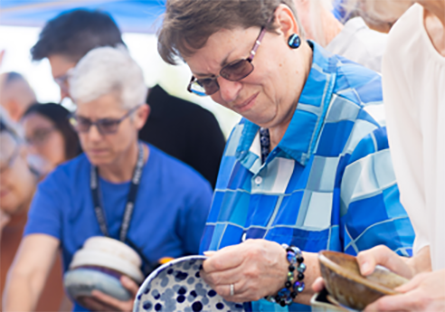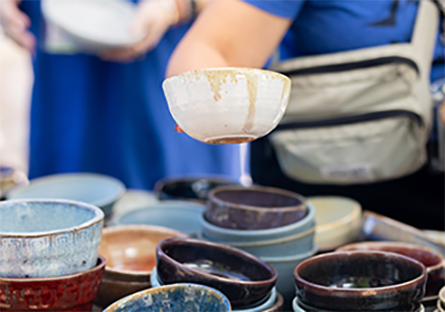




For more than 20 years, Paradise Valley Community College (PVCC) Art Professor David Bradley has made it his mission to bring people together for the communal fundraiser Empty Bowls, helping to raise both awareness and funds for food insecurity. With his retirement set for May 2025, the October event felt symbolic as students, faculty, and community members gathered for a shared soup meal, taking home hand-made ceramic bowls. The Spring 2025 Empty Bowls event will be his last.
“The Empty Bowls project has been a marriage between my love for making bowls and the reality of food insecurity. Tackling food insecurity is a huge task, but by making ceramic bowls that symbolize the total amount of calories many people consume in one day, which is not many, we remind people of the hunger that many people carry around, and which affects their mood, emotional outlook, and physiology,” explained Bradley. “I'm proud that the thousands of bowls I've made over the years have been sold and those funds have helped the efforts in our community to fight hunger.”
October’s event raised more than $1,700, the second highest Empty Bowls event on record at PVCC. With nearly 100 attendees, the event featured music from talented PVCC alumni soloist Summer Welsh, and JAM NOW’s James Austin Murray, as well as Arizona State University Pop Music Program student Alexis Gaston. Food was donated by Amici Catering.
“What David has brought to this event over the years cannot be matched. He is truly amazing, and I’m not ready to think about next year without him. He is such a beautiful human being, I am just thankful he was so willing and eager to let me into his life's work and bring my own enhancement to it,” said PVCC Social Work Faculty Stacy Moreno, who first began collaborating with Bradley on this event in 2023.
Bradley began participating in this tradition back in 1991 when the Mesa Arts Center and the Arizona Center in downtown Phoenix brought this event to the valley. He brought the bi-annual tradition to PVCC in 2000 where he has helped raise nearly $20,000 for local food banks and PVCC’s Puma Pantry on the Union Hills campus.
Addressing Food Insecurity on College Campuses
Food insecurity on college campuses has become a significant issue in recent years, as rising tuition costs, housing expenses, and other financial challenges make it difficult for many students to afford basic needs like food. A 2019 report by the Hope Center for College, Community, and Justice found that 39 percent of college students experienced food insecurity. The same report highlighted that students attending two-year institutions faced slightly higher rates of food insecurity, which is linked to lower academic performance and disproportionately affects students of color, first-generation students, and those from low-income households.
“Fundraisers like Empty Bowls play a critical role in addressing food insecurity among college students by raising awareness, funds, and providing meals to those in need,” Moreno said. “Empty Bowls is just one way PVCC is contributing to arts activism and making a real tangible difference in our local community, showing students that social change is possible, it can happen right now, and it can be fun.”
Meticulous Crafting for the Cause
Each semester, Bradley incorporates the event into his ceramic classes. He assigns his advanced ceramics students to create 12 bowls for the Empty Bowls event, helping stock it with new pieces twice a year. All proceeds from bowl sales go to the Puma Pantry, and any leftover bowls are donated to other Empty Bowls events in the valley, such as those hosted by the Sonoran Arts League in Carefree and AZCLAY in Tempe, where they’re greatly appreciated.
While the bowls may seem simple, they require skill in tasks like preparing, centering, and shaping the clay.
“Preparing the clay to make it an even consistency is very important, if the maker wants to be able to keep the clay under control while forming it,” Bradley explained. “Centering the ball of clay on the wheel is the first step for everything made on the potter’s wheel. If the clay is off center then control is lost.”
Once formed, the bowls are dried, fired twice—once to 1900°F and again after glazing to 2300°F—making them durable enough for everyday use, dishwashers, ovens, and microwaves. The process may be challenging, but each bowl serves as a lasting reminder of the importance of supporting those in need.
“The journey to our kitchens is fraught with difficulties for these bowls, but in the long run, it’s worth it because they will be eternal reminders of the need to help those in our communities who don’t have enough to eat,” Bradley said.